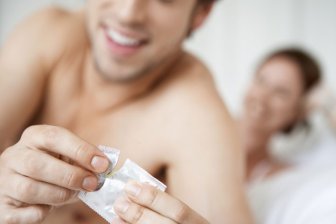WATCH ABOVE: Researchers in the Netherlands have found a way to measure how many germs are exchanged in a kiss. In a new study, scientists looked at 21 couples and measured how many microbes were exchanged when they locked lips.

TORONTO – He leans in, your lips lock, and if the chemistry’s there, time stops in its tracks. There’s a lot of pressure for the sparks to fly when you share that first intimate kiss.
Now, Dutch scientists suggest that the millions of germs swapped during a 10-second smooch could determine your romantic fate with a partner. It’s not about technique or compatibility, but if your immune system likes what it’s receiving.
Just 10 seconds of French kissing, or as the researchers described “intimate kissing,” aids in swapping as many as 80 million oral bacteria, according to findings published Monday.
That’s a lot of germs. For perspective, catching a normal infection takes about 100,000 microbes, Jason Tetro, a Canadian microbiologist and bestselling author, told Global News.
READ MORE: A spreadsheet of excuses? Here’s why married couples stop having sex
Our mouths are cesspools of bacteria, used to break down enzymes, digest food and stave off infection. We each have an individual microbiome – call it a collection of hundreds of types of bacteria.
Tetro says that when you kiss your date, his or her germs make their way into your mouth’s ecosystem. And if it’s a match, you’ll want to keep smooching.
“This study does one amazing thing, it shows you that kissing is the best way to find a mate for the long term. It might sound really gross but if the bacteria from the other person harmonizes with your bacteria, your immune system is all good. You feel a sense of calm and happiness, maybe even addiction,” he explained.

Get weekly health news
“But if the bacteria don’t align with your microbes, you actually feel disgust and revolt. Your immune system is rejecting that person as a possible mate.”
READ MORE: Having sex is all about quality, not quantity, says Canadian study
Chalk it up to biological chemistry, Tetro suggests. It even applies to swapping germs from other parts of your body.
The Dutch researchers – out of the Netherlands Organisation for Applied Scientific Research – note that primates, fish and even birds have mouth-to-mouth contact. But intimate kissing “involving full tongue contact and saliva exchange” is exclusive to humans when courting.
The “first kiss” is part of mate assessment and bonding via chemical taste in the saliva and on the surface of the tongue, they explain.
READ MORE: This one tip will improve your sex life, Canadian researcher suggests
For the study, they recruited 21 couples, who were asked about their daily kissing habits. (It’s worth noting that men had a tendency to report more kissing than their female partners. They said they’d kiss on average 10 times per day while their partners reported only five.)
The scientists swabbed their study subjects’ mouths to study the composition of bacteria on their tongues and in their saliva. Turns out, couples that took to French kissing often shared similar microbiota.
At least nine intimate kisses per day led to couples sharing strikingly similar germs.
READ MORE: Having sex is all about quality, not quantity, says Canadian study
The scientists also fed one half of the couple probiotic yogurt before smooching. When the couple French kissed, the saliva on the receiving end contained three times the probiotic bacteria that it had before the kiss.
This is how the researchers estimate that about 80 million bacteria are swapped in a mere 10 seconds.
Don’t shy away from kissing if you’re worried about germs, the scientists note. If anything, exposure to the germs may even build up your immune system’s defences.
And Tetro suggests swapping germs can even be a litmus test for a potential partner. If you’ve spent a weekend locking lips with your partner and can’t get enough, you’re a good match biologically speaking.
“This study proves that when it comes to finding the right mate, the old game of spin the bottle actually has a base in science,” he said.
The Dutch study was published Monday in the journal Microbiome. Read the full findings here.
carmen.chai@globalnews.ca
Follow @Carmen_Chai







Comments